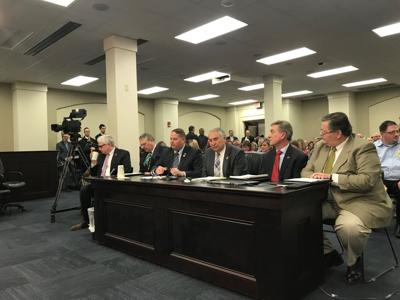FRANKFORT, Ky. (WDRB) – Citing road safety needs and a construction backlog, Kentucky’s top transportation official pushed for a higher fuel tax on Tuesday but stopped short of endorsing a bill adding a 10-cent-per-gallon increase.
“I testified a year ago that the need is dire,” Kentucky Transportation Secretary Greg Thomas told the House appropriations and revenue committee. “Well, it remains dire.”
House Bill 517 would raise the gas tax by and hike other fees, such as vehicle registration and special license plate fees, and impose charges on electric cars. In all, by 2021, the measure would generate nearly $498 million per year for the state’s road fund.
Thomas sought to compare the gas tax increase to less than the monthly cost of a typical Netflix subscription. “We’re in support of anything that would increase revenue,” he told lawmakers. “But if anything, I would go farther in terms of where do we go with this investment in our infrastructure.”
He declined to say if he supported the bill, instead deferring to Gov. Matt Bevin’s office. A spokeswoman for the governor did not immediately respond to a request for comment.
Thomas was joined by state and local leaders who are urging increased revenue for Kentucky's road fund. A similar bill garnered discussion but failed to advance last year.
Wednesday’s hearing came with just seven working days left in the 2019 General Assembly and didn’t include a vote. After the meeting, budget committee chairman Rep. Steven Rudy said the bill has “a long way to go and a short time to get there” and couldn’t say if he’ll bring it up for a vote.
He also expressed doubt about bills like the gas tax measure that still have yet to get a committee vote.
“The chances of a House bill making it all the way across the finish line at this point is very difficult,” he said.
The bill’s main sponsor, Rep. Sal Santoro, said he still has hope that it could be approved this session. But, he added: “I’m not going to take it to a vote until I know for sure that I can get it out of the House. I want 75 votes in the House.”
As a revenue bill in a non-budget year, it would need 60 percent of votes in the House and Senate, not a simple majority. The House has 100 members.
Tied to the wholesale price of gasoline, fuel tax collections have lagged behind the levels of several years ago. And the state faces other pressures, including nearly $8 million in unfunded state projects, a federal highway fund that’s on pace to run out of money and the looming construction of bridges in northern and western Kentucky.
Meanwhile, the state is set to exhaust a supply of federal credits by next year that has generated more than $100 million annually. Kentucky has used those credits on federal projects, allowing it to spend state funds on other projects.
The gas tax bill has broad support from transportation industry groups, including a coalition organized by Kentuckians for Better Transportation, Greater Louisville Inc., and the Kentucky Chamber of Commerce.
Its most vocal opponent is the conservative group Americans for Prosperity. On Tuesday, Kentucky chapter director Andrew McNeill tried to address the bill but was told by Rudy that he didn’t indicate he wanted to speak.
After the meeting, McNeill said Rudy didn’t want to hear opposition because “he knows it can’t withstand the scrutiny that a clear analysis of why 517 is misguided would clearly demonstrate.”
McNeill said a vote ought to happen this year.
“These members’ constituents and voters deserve to know where they stand on this issue of higher gas taxes,” he said. “If the issue is so compelling, if our infrastructure is such a priority to their voters at home, then they don’t have anything to worry about.”











